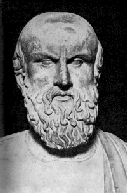Aeschylus (525?-456 BC), Greek dramatist, the earliest of the great tragic poets of Athens. As the predecessor of Sophocles and Euripides, he is called the father of Greek tragedy. Aeschylus was born in Eleusis, near Athens.
Aeschylus fought successfully against the Persians at Marathon in 490 BC, at Salamís in 480 BC, and possibly at Plataea the following year. He made at least two trips, perhaps three, to Sicily. During his final visit he died at Gela, where a monument was later erected in his memory.
Aeschylus is said to have written about 90 plays. His tragedies, first performed about 500 BC, were presented as trilogies, or groups of three, usually bound together by a common theme. Each trilogy was followed by a satyr drama (low comedy involving a mythological hero, with a chorus of satyrs). The titles of about 80 of his plays are known, but only 7 have survived. The earliest is The Persians, presented in 472 BC, a historical tragedy about the Battle of Salamís, with the scene laid in Persia at the court of the mother of King Xerxes I. The Suppliants, a drama with little action but many choral songs of great beauty, is believed to be the first play of a trilogy about the marriage of the 50 daughters of Danaüs, which included the plays The Egyptians and The Danaïds.
The Seven Against Thebes, produced in 467 BC, is based on a Theban legend concerning the conflict between the two sons of Oedipus, Eteocles and Polynices, for the throne of Thebes (see Seven Against Thebes). It is believed to be the third play of a trilogy, the first two being Laius and Oedipus. Prometheus Bound, a work of uncertain date, portrays the punishment of the defiant Prometheus by Zeus. It is probably the first play of a Promethean trilogy, the others being Prometheus Unbound and Prometheus the Fire-Bringer.
The remaining three plays-Agamemnon, The Libation Bearers, and The Eumenides-produced in 458 BC, form the trilogy known as the Oresteia, or story of Orestes. In Agamemnon, one of the greatest works of dramatic literature, King Agamemnon returns home from the Trojan War and is treacherously murdered by his faithless wife Clytemnestra. In the second play, Orestes, the son of Agamemnon, returns to Argos and avenges the murder of his father by slaying his mother and her paramour Aegisthus. This act of matricide is in turn punished by the avenging goddesses, the Erinyes. In The Eumenides, the Erinyes pursue Orestes until he is cleansed of his blood guilt and set free by the ancient court of the Areopagus through the intercession of Athena, goddess of wisdom.
By introducing the innovation of a second actor, Aeschylus created the possibility of dramatic dialogue in which the action of a play is advanced. He also elaborated the staging of the drama, introducing costumes and scenery. The characteristics of his works are the profundity of theme and the grandeur of the poetry recited by the chorus. The Oresteia, probably his most mature work, provides an insight into his concepts of justice and mercy and his belief in a divine will, which can help humanity achieve wisdom through suffering.
Work excited
Contributed by: George E. Duckworth "Aeschylus," Microsoft(R) Encarta(R) 96 Encyclopedia. (c) 1993-1995 Microsoft Corporation. All rights reserved. (c) Funk & Wagnalls Corporation. All rights reserved.
